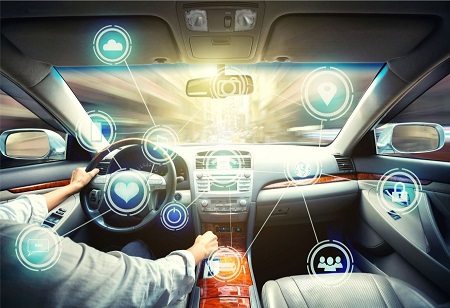
The automotive industry is one of the largest manufacturing sectors in the world. In addition to geopolitical factors, the absence of novel features in more recent car models is one of the major contributors to this fall in sales. Customers are inclined to choose an older, less expensive, or used car if all they need is four wheels and an engine. Newer models need to embrace the future by utilising cutting-edge technologies and the Internet of Things in order for automakers to draw customers.
Through the use of predictive maintenance, direct car-to-car communication, AI-powered driving assistance, and other cutting-edge features, IoT solutions transform automobiles into intelligent modes of transportation that improve driving efficiency and road safety for both private persons and commercial drivers. IoT is also used by the auto industry to automate production procedures, lower the possibility of human mistake, and improve quality control. Let us look at how IoT is enhancing efficiency in automotive industry.
Clear picture of the manufacturing floor
Massive volumes of data may be gathered at manufacturing locations by means of industrial IoT systems. Real-time processing and analysis of such data assists automakers in better understanding and streamlining every aspect of the manufacturing process, introducing higher safety requirements, and minimising losses.
IoT can make a significant improvement to the automobile manufacturing process. Significantly less time and money are spent on production as well. With no loss in product quality, the data produced by the sensors and gateways can assist reduce resource waste. The historical data gathered by the fleet's IoT sensors serves as a major source of inspiration for design ideas.
Manufacturers can enhance their engineering services by learning from the data that has been gathered. This data-driven approach of IoT devices also aids in the analysis of the car's product life cycle, ultimately improving the entire workflow in the automotive sector.
Preventing Component failure
One of the most astonishing aspects of the IoT automotive is predictive analytics. The sensors built into various auto parts gather data and upload it to a platform. An algorithm that can analyse the component's future results based on its performance then processes this data.
A person can use an IoT automotive maintenance system to help them take the required precautions to stop their car parts from breaking down unexpectedly. Similar to a car's dashboard indicators, this system warns the driver of potential faults. But long before the issue even arises, the alarms are delivered to the driver's mobile device. This enables the driver to take quick, efficient actions to prevent component failure while driving.
Both a fleet of vehicles and a single vehicle can use the capabilities of predictive maintenance. For load-carrying vehicles that must drive for days before arriving at their destination, it is extremely helpful. A user can check the performance of their car and fix any broken parts by using the automotive maintenance system.
Smart infrastructure & enhanced car maintenance
The advantages of IoT in the automotive industry go beyond better vehicles and fewer accidents. Infrastructure and roads are essential to the automotive industry. Additionally, drivers can utilise smart infrastructure with IoT and AI apps in place, which enhances the driving experience, boosts road safety, facilitates hassle-free parking management, and lowers collision rates.
Users can be prompted to take preventive action to avert failures and save money on automobile maintenance by using the data gathered from IoT sensors installed in vehicles to identify pre-failure car conditions.
Real examples of automotive companies using IoT-based solutions
In order to enhance driver safety, vehicle performance, and the driving experience while streamlining the entire manufacturing process, automotive businesses are increasingly implementing IoT-based solutions. The Internet of Things has several uses in the automotive industry. Let's look at some actual instances of automakers utilising IoT-based solutions:
Elon Musk's "Tesla Motors" is a top producer of electric vehicles that has effectively incorporated IoT into its automobiles. Tesla manufacturers incorporate Internet of Things (IoT) sensors in the cars, which help collect information based on driving habits, battery life, vehicle performance, etc. This information is sent to Tesla's servers, where IT professionals examine it to identify any problems and address them immediately before they become serious.
Another top automaker using IoT-based solutions to enhance the driving experience and vehicle quality is Ford. Ford's plants are equipped with IoT sensors that keep tabs on equipment, inventories, and production at every stage of the manufacturing process.
Mark Fields, the CEO and president of Ford, has been using IoT tools to create autonomous vehicles for more than a decade. Other noteworthy IoT applications in the Ford service portfolio include GoDrive and GoPark, a predictive parking system that steers customers to an appropriate parking space, and FordPass, a hub for connected car services including car sharing, remote locking, vehicle location, etc.
The automotive industry has seen some significant advancements thanks to the Internet of Things. Its use has changed how cars may be tested and maintained, and it has given customers access to cutting-edge and user-friendly entertainment devices. Additionally, smart fleet management solutions that are not only effective but also safer and more cost-effective have been developed thanks to long-range data transfer in car telematics.

